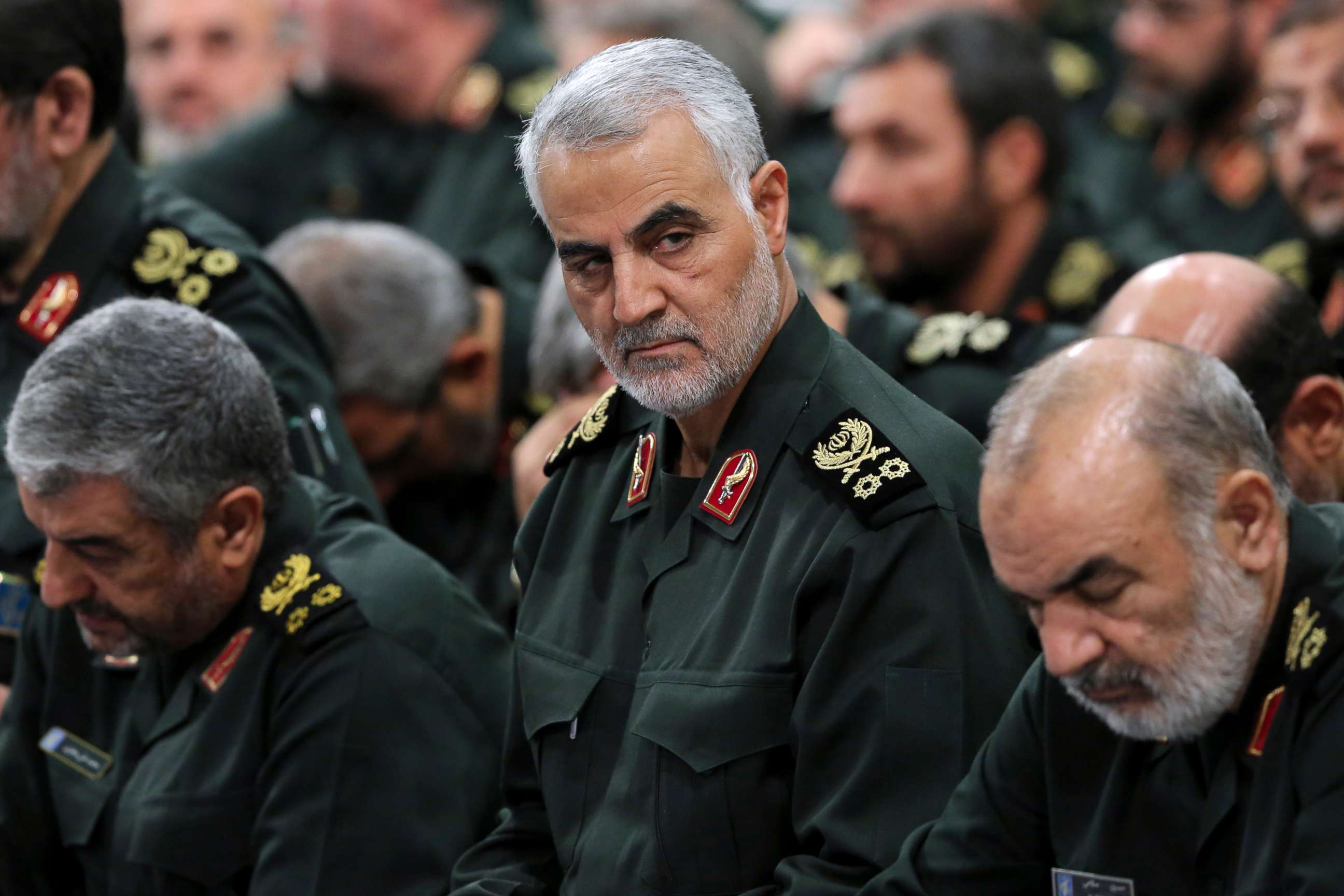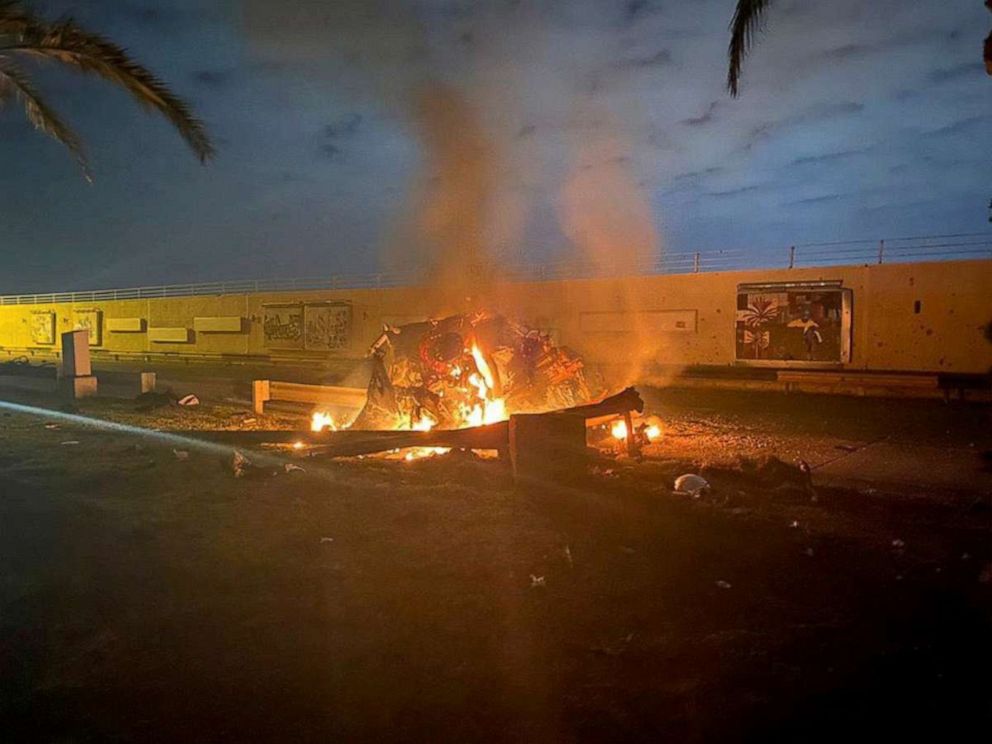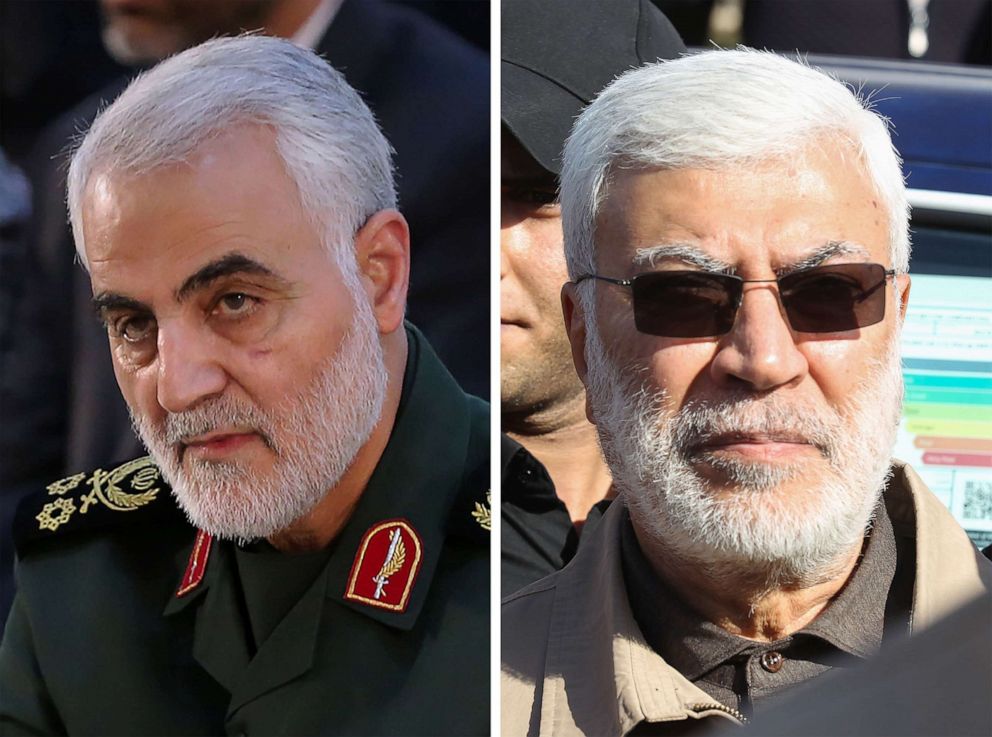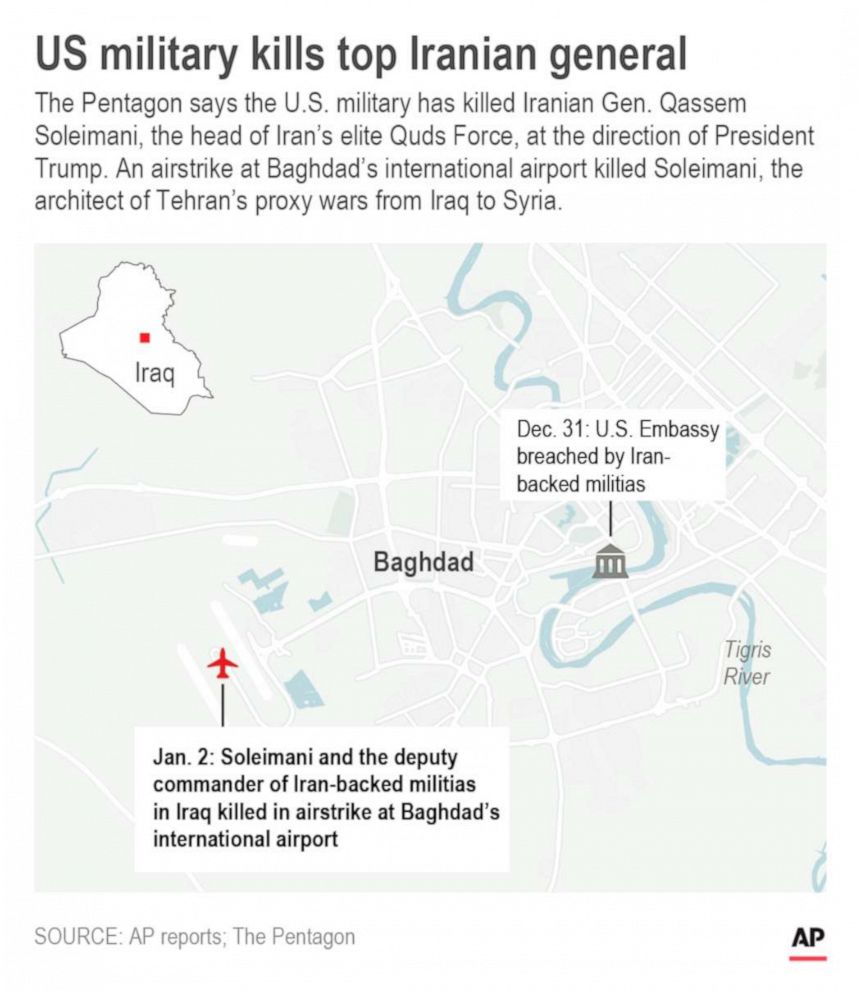Leader of Iran's elite Quds Force killed in US airstrike near Baghdad airport
The strike "was aimed at deterring future Iranian attack plans," officials said.
Qassem Soleimani, the leader of Iran's elite Quds Force, was killed late Thursday in a U.S. airstrike that targeted a convoy near the main airport in Baghdad.
Iraqi militia commander Abu Mahdi al-Muhandis also died in the airstrike, Ahmed al-Assadi, a spokesman for Iraq's Popular Mobilization Forces umbrella grouping of Iran-backed militias, confirmed to ABC News.
Officials with the U.S. Department of Defense confirmed in a statement to ABC News that U.S. forces were responsible for the attack.

"At the direction of the President, the U.S. military has taken decisive defensive action to protect U.S. personnel abroad by killing Qasem Soleimani, the head of the Iranian Revolutionary Guard Corps-Quds Force, a U.S.-designated Foreign Terrorist Organization," the statement read. "General Soleimani was actively developing plans to attack American diplomats and service members in Iraq and throughout the region."
Following the strike, the U.S. State Department issued an alert early Friday morning urging U.S. citizens to leave Iraq and to avoid the U.S. embassy in Baghdad.

"Due to heightened tensions in Iraq and the region, we urge U.S. citizens to depart Iraq immediately," the alert said. "Due to Iranian-backed militia attacks at the U.S. Embassy compound, all consular operations are suspended. U.S. citizens should not approach the Embassy."
Soleimani and the Quds Force "were responsible for the deaths of hundreds of American and coalition service members and the wounding of thousands more," said the Department of Defense statement explaining the strike. "He had orchestrated attacks on coalition bases in Iraq over the last several months -- including the attack on December 27th -- culminating in the death and wounding of additional American and Iraqi personnel."
One U.S. civilian contractor was killed and several service members were wounded in the Dec. 27 rocket attack on the K1 military base used by U.S. and coalition forces in northern Iraq. The attack led to retaliatory U.S. military strikes in Iraq and Syria Sunday against the Iranian-backed militia the U.S. blamed for the Dec. 27 attack, which in turn led hundreds of pro-Iranian protesters to attempt to storm the U.S. embassy in Baghdad on New Year's Eve.
Thursday's strike against Soleimani "was aimed at deterring future Iranian attack plans," the U.S. statement continued. "The United States will continue to take all necessary action to protect our people and our interests wherever they are around the world."

In Iran, Supreme Leader Ayatollah Khamenei promised retribution for the strike.
"Years of sincere, brave efforts fighting against the devils & villainous in the world & yrs of wishing for martyrdom on the path of God finally took the dear Commander of Islam, Soleimani, to this lofty status," Khamenei tweeted. "His efforts & path won't be stopped by his martyrdom, by God's Power, rather a #SevereRevenge awaits the criminals who have stained their hands with his & the other martyrs' blood last night. Martyr Soleimani is an Intl figure of Resistance & all such people will seek revenge."
"Targeting & assassinating General Soleimani -- THE most effective force fighting Daesh (ISIS), Al Nusrah, Al Qaeda et al -- is extremely dangerous & a foolish escalation," Iranian Foreign Minister Javad Zarif said on Twitter. "The US bears responsibility for all consequences of its rogue adventurism."
Officials in the largest U.S. cities said they were marshaling resources following Thursday's military action.
"Have spoken with Commissioner Shea + Dep Commissioner Miller about immediate steps NYPD will take to protect key NYC locations from any attempt by Iran or its terrorist allies to retaliate against America," New York City Mayor Bill de Blasio said on Twitter, referring to New York Police Department Commissioner Dermot Shea and Deputy Intelligence Commissioner John Miller. "We will have to be vigilant against this threat for a long time to come."
"While there is no credible threat to Los Angeles, the LAPD is monitoring the events developing in Iran," Los Angeles Police Department officials tweeted. "We will continue to communicate with state, local, federal and international law enforcement partners regarding any significant intel that may develop."

U.S. reaction to the strike was largely split down party lines.
"Qassem Suleimani was responsible for the deaths of hundreds of Americans and his death presents an opportunity for Iraq to determine its own future free from Iranian control," Sen. Jim Risch (R-Idaho), chairman of the Senate Foreign Relations Committee, said in a statement. "As I have previously warned the Iranian government, they should not mistake our reasonable restraint in response to their previous attacks as weakness. The U.S. will always vigorously defend our interests and allies in the face of terrorist conduct and provocations."
"The defensive actions the U.S. has taken against #Iran & its proxies are consistent with clear warnings they have received," Sen. Marco Rubio (R-Florida), another Foreign Relations Committee member, posted to Twitter. "They chose to ignore these warnings because they believed @POTUS was constrained from acting by our domestic political divisions. They badly miscalculated."
"Soleimani was an enemy of the United States. That's not a question," Sen. Chris Murphy (D-Connecticut), who is also on the Foreign Relations Committee, tweeted. "The question is this - as reports suggest, did America just assassinate, without any congressional authorization, the second most powerful person in Iran, knowingly setting off a potential massive regional war?"
"Trump Admin owes a full explanation of airstrike reports -- all the facts -- to Congress & the American people," Sen. Richard Blumenthal (D-Connecticut), who is on the Senate Armed Services Committee, said on Twitter. "The present authorizations for use of military force in no way cover starting a possible new war. This step could bring the most consequential military confrontation in decades. My immediate concern is for our brave Americans serving in harm's way."
ABC News' Elizabeth McLaughlin, Matt McGarry and Megan Hughes contributed to this report.



